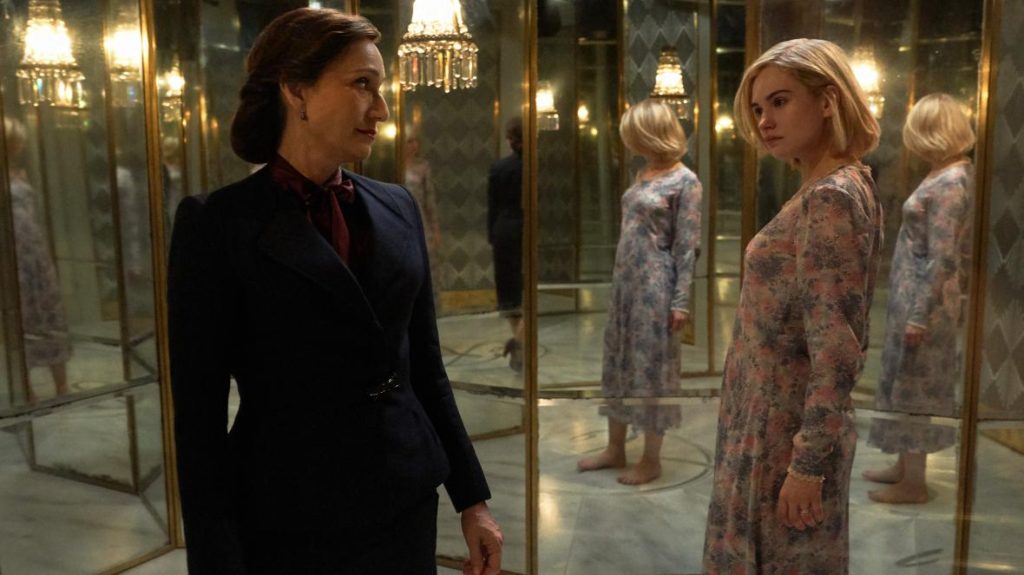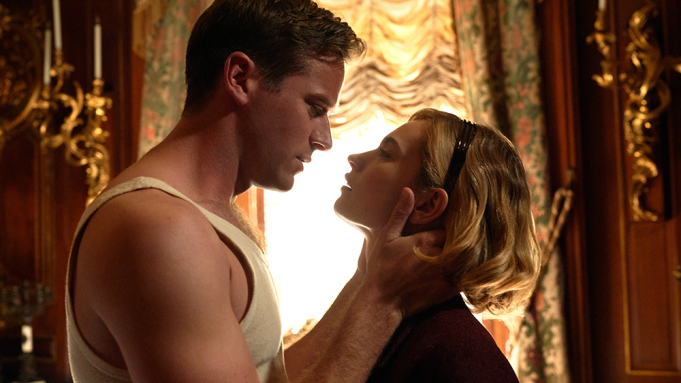Joe’s Take
I have a very short history with “Rebecca,” which is completely my fault. About 13 years ago, the Daphne du Maurier novel was on my high school summer reading list along with Jane Austen’s “Emma.” Let me tell you, those first name titles do a lot to pull you in. Needless to say, I did what I always did at that age. I got the book, turned to the back page and saw it was 600 PAGES LONG! (I could be exaggerating. I just remember it was too many pages. But since I can’t find a straight answer in a Google search, I’m going to stick with 600 pages for the duration of this review). I’ll give teenage me credit, though. I started to read it. However, I got about 100 pages in and had enough. I planned to get the CliffNotes, but our class was bailed out on the first day of school. Turned out we wouldn’t be tested on the books we were supposed to read during the summer. I put “Rebecca” aside and expected never to pick it up again. I was right … sort of.
Thirteen years later, Netflix released a “Rebecca” remake. While I didn’t know I would have an interest in movie reviewing back then, here we are. I would finally find out what “Rebecca” actually is. After watching the remake with no knowledge of the plot because my teenage brain apparently didn’t take much in, I realized I made a terrible mistake. Not because the remake was anything spectacular. I just know it was done better before. The story is incredibly intriguing, but the execution proves poor. I should have read the book or watched the Alfred Hitchcock-directed 1940 original, which earned two Oscar wins, including best picture, and 11 nominations … Oops.
I will say the first 30 minutes of the film bored me. This is where teenage Joe gets a little credit. Does 30 minutes of a 2-hour movie equate to 100 pages of a 600-page book? It’s a little off percentage-wise, but I’m going to give the benefit of the doubt to the 17-year-old. It was boring. The soon-to-be Mrs. de Winter (Lily James) builds a quick chemistry with the mysterious Maxim de Winter (Armie Hammer). That’s the first 30 minutes of the movie. That’s it. I didn’t know what it was building toward, so to me it was just a random relationship where the two have some chemistry. I will say the scenery is gorgeous during those 30 minutes, the only redeeming quality of the first act. The beautiful colors also work for later in the film as they clash against the dark, dreary Manderley estate. When the newly wed couple returns to Manderley, the film picks up. That is to say it finally found the plot.
Mystery lies around Maxim’s late wife, Rebecca. I’m as nosey as they come and I can’t keep a secret, so living with Maxim would drive me insane. He doesn’t tell Mrs. de Winter anything about Rebecca (Side note: Lily James’ character is Mrs. de Winter as she is given no other name in the film until she marries Maxim). It really made me hate Maxim and feel bad for Mrs. de Winter. I’m sure this is what’s supposed to happen, but to me it comes out of nowhere. Therein lies the biggest problem of the film. The great source material was there. The filmmakers just didn’t execute.
I like James and Hammer a lot. I’ve seen both do great things. They were misdirected in this film. What I will give the first 30 minutes is that James and Hammer built a natural chemistry. It made sense they were together. When they got back to Manderley, it was as if a switch flipped. They were not on the same page. Hammer acted way out of character from what we saw earlier. James tried, but there was only so much she could do with the filmmakers’ poor vision. This movie claimed to be different, but then went through the motions. The Oscar-nominated Kristin Scott Thomas also ended up in a one-note, over-the-top role as Mrs. Danvers. This film had the talent, but it didn’t execute.
It’s also frustrating that throughout the film certain things are hinted at, which is cool … until they outright say what was only hinted at earlier in the movie. We don’t need to be treated like idiots. We get it.
The plot held my interest because I had no idea what was going on. However, there was no real thrill to it. It was just a mystery that needed to be solved. Once it was, I only had more questions for the filmmakers. I shouldn’t be questioning what happened earlier in the film mid-movie. After knowing the basic plot, I can’t imagine revisiting this adaptation again. I’d be bored and I imagine the people who adore the book or the original film hated this movie.
Ultimately, this just feels like a live-action Disney remake. What is the point when you’re going to do mostly the same thing? And the stuff that’s added tends to be a detriment to the film. From research, I know the remake extended the ending and there’s no reason to. I realize studios love remakes and franchises, but if we need to keep seeing these movies at least reimagine them. Tell the story in a new light.
I’m only realizing now that I didn’t like much about “Rebecca” except the scenery and the colors. It took actors I like and relegated them to run-of-the-mill work. It took interesting source material and turned it bland. A coach can create a great gameplan, but the players have to execute. There was no point during the film where I saw anything other than a bunch of people running through the motions. I’d like to watch the Hitchcock film, but I wish I went into it fresh. Now, I know the plot. And if I could talk to 17-year-old Joe today, I’d tell him to suck it up.
1.5 out of 5 stars

Kristin Scott Thomas, left, and Lily James star in “Rebecca.”
Rebecca’s Take
I have a long history with “Rebecca,” which starts with sharing the name of the 1938 Daphne du Maurier novel and 1940 Alfred Hitchcock film adaptation. My mother is a fan of classic movies, and I grew up watching them with her, including Hitchcock’s many films. (I wasn’t named after this movie, however; that distinction goes to the 1938 Shirley Temple flick “Rebecca of Sunnybrook Farm.”)
Since my teens, the Master of Suspense has been my favorite director, and “Rebecca” is among my top 5 favorites of his films. The movie also stars Joan Fontaine, one of my favorite actresses from Hollywood’s Golden Era. A film-loving friend even gave me a copy of the book in high school, but unfortunately, I still haven’t read it. (My copy is 380 pages, so Teen Joe exaggerates). The lavish Gothic mystery won best picture, Hitchcock’s only film to claim the Oscars’ top honor.
Valuing Hitchcock’s original as much as I do, I was excited to learn a new adaptation of “Rebecca” was coming to Netflix. I also knew it would be impossible for me to review the new version without comparing it to the 1940 masterpiece. Much like how the shadow of the titular character looms over the story, Hitchcock’s superior version hangs over this hollow retread. Despite an engaging first act and its masterful use of color, the dull “Rebecca” barely justifies its existence. The watchable but disappointing remake lacks the suspense of the original, stranding its talented cast in a middling effort.
Set in the early 1940s, “Rebecca” follows a nameless narrator (Lily James), an unsophisticated ladies’ companion who falls in love with wealthy and brooding widower Maxim de Winter (Armie Hammer). After the two marry, Maxim brings his young wife back to his luscious English estate, Manderley.
But it’s not a happy homecoming. The new Mrs. de Winter encounters constant comparisons to Maxim’s deceased wife, Rebecca, and judgmental looks from the wait staff. This includes steely housekeeper Mrs. Danvers (Kristin Scott Thomas), who is fiercely devoted to the late Mrs. de Winter. As Maxim grows more distant, his new wife finds herself haunted by Rebecca’s ever-present memory and threatened by a mansion full of secrets.
The new “Rebecca” starts out strong as it develops the love story between its lead couple. Compared to the 1940 version, director Ben Wheatley’s adaptation deepens the level of conversation between Maxim and his future wife as they go for long drives and secret rendezvous. While Hitchcock’s film was handcuffed by the era’s restrictive morality codes, the new version adds steamy scenes between Hammer and James, showing the progression of their relationship. The first act flew by as I got to know the familiar couple in a new light.
Following in the footsteps of the distinguished Laurence Olivier and the mousy Fontaine, the elegant Hammer and James are well-matched, sharing a lovely chemistry that makes their whirlwind romance believable. The two characters are closer in age here, which eliminates some uncomfortable references to Fontaine’s character’s younger age in the 1940 version. The new adaptation also gives James’s initially timid narrator more agency, updating the character for a modern audience. As the audience’s conduit, James is sympathetic as the nameless narrator becomes Mrs. de Winter and forges her own identity.
When the couple arrive at Manderley, “Rebecca” shifts gears to the mystery part of the story, and that’s where the film loses momentum. The fascinating premise of “Rebecca” lies in that its titular character is dead before the story starts, yet her presence is keenly felt. In the 1940 film, Hitchcock justified his nickname by creating an atmosphere dripping with suspense. The confined and suffocating environment sees the walls closing in on Fontaine as she tries to figure out if she’s dealing with not just Rebecca’s memory, but a supernatural entity. In Wheatley’s version, “Rebecca” fails to wind up the tension as its mystery unfolds. The second act is where the film should pick up, but instead the story slows down, becoming boring.
The character dynamics are devoid of the spark that drives the intrigue in the original. Hammer’s Maxim is less volatile than Olivier’s interpretation, which makes the character more staid and less interesting. This Maxim is actually too nice, which causes his outbursts to feel inconsistent and not a character trait. Scenes between Mrs. de Winter and Mrs. Danvers that were pivotal to the 1940 film – including the infamous tour of Rebecca’s bedroom – are bland and subdued here. The polite dynamic between James and Thomas doesn’t convey the unease that constantly simmers under the surface between Fontaine and the stoic Judith Anderson in the original.
When the mystery is finally revealed, the third act turns scattered and messy. The anticlimactic finale is unnecessarily prolonged. While the ending of the 1940 film may feel abrupt to some, the story doesn’t overstay its welcome. The new “Rebecca” tries to tie up its loose ends, but doing so adds very little to the overall story.
What “Rebecca” does have going for it is its lush scenery. While the 1940 film was shot in black and white, the new version pops in glorious color. The beginning, set at the relaxing resorts and beaches of Monte Carlo, features bright pastel shades, including yellow, orange and pink. This makes for a greater contrast when the location shifts to the gloomy Manderley, bathed in grays and muted tones. But the film’s color capabilities are still on full display. In one gorgeous scene, James’ solitary figure stands in a green sweater amid the growing grass of the estate as the camera pans out. A spectacular sequence after a costume ball lights up with reds and blues.
Despite having my name, “Rebecca” let me down. The remake is all style and little substance, lacking the tension that defined the Oscar-winning adaptation and cemented Hitchcock’s legacy. The original played an important role in my life as I developed my taste in cinema. There’s a reason that film has stuck with me, and there’s a reason this one won’t. “Rebecca” may bring some new aspects of the classic story to the table, but the mediocre remake won’t overtake the memory of the haunting original.
2 out of 5 stars

Rebecca Kivak and Joe Baress write about movies for Take 2 blog. Together, they review current flicks and offer their insights into the latest movie news. Rebecca is a copy editor and page designer at The Times-Tribune. She started her career with Times-Shamrock Newspapers in 2005 and has won several professional journalism awards for page design and headline writing. She also covers NASCAR races from Pocono Raceway. Contact: rkivak@timesshamrock.com; 570-348-9100 x5126; @TTRebeccaKivak




